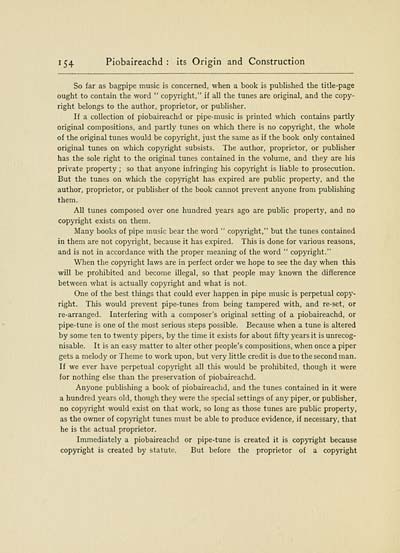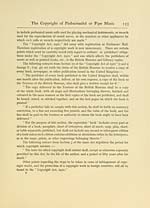Hew Morrison Collection > Piobaireachd
(160)
Download files
Complete book:
Individual page:
Thumbnail gallery: Grid view | List view

154 Piobaireachd : its Origin and Construction
So far as bagpipe music is concerned, when a book is published the title-page
ought to contain the word " copyright," if all the tunes are original, and the copy-
right belongs to the author, proprietor, or publisher.
If a collection of piobaireachd or pipe-music is printed which contains partly
original compositions, and partly tunes on which there is no copyright, the whole
of the original tunes would be copyright, just the same as if the book only contained
original tunes on which copyright subsists. The author, proprietor, or publisher
has the sole right to the original tunes contained in the volume, and they are his
private property ; so that anyone infringing his copyright is liable to prosecution.
But the tunes on which the copyright has e.xpired are public property, and the
author, proprietor, or publisher of the book cannot prevent anyone from publishing
them.
All tunes composed over one hundred years ago are public property, and no
copyright exists on them.
Many books of pipe music bear the word " copyright," but the tunes contained
in them are not copyright, because it has expired. This is done for various reasons,
and is not in accordance with the proper meaning of the word " copyright."
When the copyright laws are in perfect order we hope to see the day when this
will be prohibited and become illegal, so that people may known the difference
between what is actually copyright and what is not.
One of the best things that could ever happen in pipe music is perpetual copy-
right. This would prevent pipe-tunes from being tampered with, and re-set, or
re-arranged. Interfering with a composer's original setting of a piobaireachd, or
pipe-tune is one of the most serious steps possible. Because when a tune is altered
by some ten to twenty pipers, by the time it exists for about fifty years it is unrecog-
nisable. It is an easy matter to alter other people's compositions, when once a piper
gets a melody or Theme to work upon, but very little credit is due to the second man.
If we ever have perpetual copyright all this would be prohibited, though it were
for nothing else than the preservation of piobaireachd.
Anyone publishing a book of piobaireachd, and the tunes contained in it were
a hundred years old, though they were the special settings of any piper, or pubHsher,
no copyright would exist on that work, so long as those tunes are public property,
as the owner of copyright tunes must be able to produce evidence, if necessary, that
he is the actual proprietor.
Immediately a piobaireachd or pipe-tune is created it is copyright because
copyright is created by statute. But before the proprietor of a copyright
So far as bagpipe music is concerned, when a book is published the title-page
ought to contain the word " copyright," if all the tunes are original, and the copy-
right belongs to the author, proprietor, or publisher.
If a collection of piobaireachd or pipe-music is printed which contains partly
original compositions, and partly tunes on which there is no copyright, the whole
of the original tunes would be copyright, just the same as if the book only contained
original tunes on which copyright subsists. The author, proprietor, or publisher
has the sole right to the original tunes contained in the volume, and they are his
private property ; so that anyone infringing his copyright is liable to prosecution.
But the tunes on which the copyright has e.xpired are public property, and the
author, proprietor, or publisher of the book cannot prevent anyone from publishing
them.
All tunes composed over one hundred years ago are public property, and no
copyright exists on them.
Many books of pipe music bear the word " copyright," but the tunes contained
in them are not copyright, because it has expired. This is done for various reasons,
and is not in accordance with the proper meaning of the word " copyright."
When the copyright laws are in perfect order we hope to see the day when this
will be prohibited and become illegal, so that people may known the difference
between what is actually copyright and what is not.
One of the best things that could ever happen in pipe music is perpetual copy-
right. This would prevent pipe-tunes from being tampered with, and re-set, or
re-arranged. Interfering with a composer's original setting of a piobaireachd, or
pipe-tune is one of the most serious steps possible. Because when a tune is altered
by some ten to twenty pipers, by the time it exists for about fifty years it is unrecog-
nisable. It is an easy matter to alter other people's compositions, when once a piper
gets a melody or Theme to work upon, but very little credit is due to the second man.
If we ever have perpetual copyright all this would be prohibited, though it were
for nothing else than the preservation of piobaireachd.
Anyone publishing a book of piobaireachd, and the tunes contained in it were
a hundred years old, though they were the special settings of any piper, or pubHsher,
no copyright would exist on that work, so long as those tunes are public property,
as the owner of copyright tunes must be able to produce evidence, if necessary, that
he is the actual proprietor.
Immediately a piobaireachd or pipe-tune is created it is copyright because
copyright is created by statute. But before the proprietor of a copyright
Set display mode to: Large image | Transcription
Images and transcriptions on this page, including medium image downloads, may be used under the Creative Commons Attribution 4.0 International Licence unless otherwise stated. ![]()
| Early Gaelic Book Collections > Hew Morrison Collection > Piobaireachd > (160) |
|---|
| Permanent URL | https://digital.nls.uk/81165837 |
|---|
| Description | A selection of items from a collection of 320 volumes and 30 pamphlets of literary and religious works in Scottish Gaelic. From the personal library of Hew Morrison, the first City Librarian of Edinburgh. |
|---|
| Description | Selected items from five 'Special and Named Printed Collections'. Includes books in Gaelic and other Celtic languages, works about the Gaels, their languages, literature, culture and history. |
|---|

